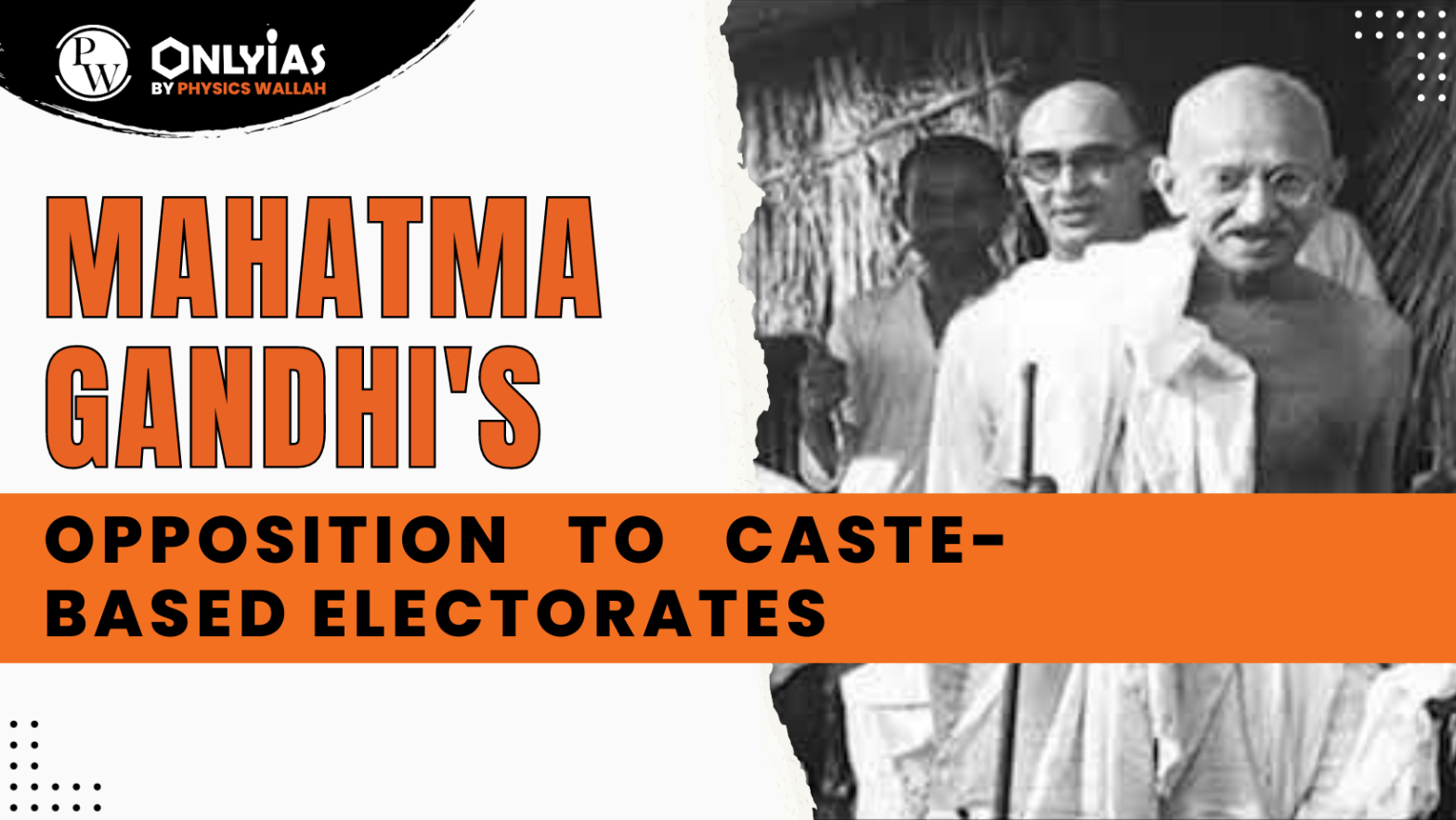Context:
| Relevancy for Prelims: Poona Pact, Separate Electorate, Communal Award, Gandhi and Ambedkar’s role in Indian History, and differences between their views.
Relevancy for Mains (GS Paper 1): Poona Pact, Separate Electorate, Gandhi and Ambedkar’s role in Indian History and differences between their views and Indian Society. |
Mahatma Gandhi’s Vision: Unifying India, Empowering Marginalized
- To protect National Unity; Mahatma Gandhi firmly believed that It would perpetuate division among Indians.
- The hindrance to social reform; He believed that caste-based political representation could hinder efforts to eradicate the caste system in India.
- To equal political representation; He advocated for universal suffrage and rather caste-based separate electorates.
- To protect National identity; Further, he believed that separate electorates could weaken the sense of a unified Indian nation.
- To empower marginalized communities; He wanted marginalized communities to participate in the broader political process rather than being isolated.
Mahatma Gandhi’s Transformative Journey: From Caste Norms to Unity
- Earlier Orthodox Views: Initially, Mahatma Gandhi supported traditional caste norms, advocating for inter-dining and inter-marriage prohibitions, considering caste fundamental to Hinduism.
- Evolution Amid National Movement: Gandhi’s views evolved as he assumed a pivotal role in India’s national movement, influenced by the emerging Dalit movement.
- He began preaching unity and condemned untouchability, coining the term “harijans” for untouchables, emphasizing their status as children of God.
- Critique of Untouchability: He openly criticized untouchability, recognizing its harmful impact on both spiritual and national well-being in 1936.
Mahatma Gandhi’s evolving strategy against the caste-based separate Electorates
-
By Movement: Harijan Sevak Sangh Movement 1932
- It was a non-profit organization founded by Gandhiji in 1932.
- Through it, Mahatma Gandhi tried to uplift the untouchables, whom he referred to as “Harijans” (Children of Hari/God).
- He also stressed education, social reform, and equal rights for Harijans.
-
By Fasting
- One of the most potent weapons.
- A form of penance as well as applying pressure to power.A way of harnessing his immense popularity with the masses to make the British acquiesce/agree to his demands.
Ambedkar’s views on Caste
- View of Rejection: Any revolt against the caste system would only be possible after the oppressed themselves rejected their condition and oppression as being divinely ordained.
- Rejection of Shastras: Bringing an end to the caste system would only be possible if the divine authority of the holy scriptures was rejected first.
Ambedkar’s Views on Separate Electorates
-
Ambedkar’s Belief
- Affirmative Action: Ambedkar suggested separate electorates as a form of affirmative action to empower lower castes.
- Favor to Double Vote: He favored separate electorates with double votes – one for SCs to vote for an SC candidate and the other for SCs to vote for in the general electorate.
- Against Joint Electorates: For him, joint electorates enabled the majority to influence the election of the representatives of the Dalit community, and thus disabled them from defending the interests of their oppression against the ‘tyranny of the majority’.
-
Mahatma Gandhi’s Opposition:
-
- Restriction to Rule the World: He argued that rather than being restricted to just this measly share of seats, lower castes should aspire to rule “the kingdom of the whole world”.
- Exploitative Step: He rightly understood British intentions of exploiting internal divisions in Indian society for their own purposes. Separate electorates would only help the British ‘divide and rule’.
- This was also a time when antagonism between Hindus and Muslims was rising. If separate electorates were announced, this would significantly reduce the Indians’ power.
The Poona Pact – Reservations for Lower Castes: Efforts by Gandhi
- Gandhi’s Action: On September 20, 1932, He began a fast unto death in Yerawada Jail in Pune against the British decision to create separate electorates based on caste.
- “This is a God-given opportunity that has come to me,” Gandhiji said from his prison cell, “to offer my life as a final sacrifice to the downtrodden”.
- Ambedkar’s Dilemma: Ambedkar disagreed with Mahatma Gandhi’s political reservations and he knew Gandhi was the nation’s most loved political leader, and if something were to happen to him, the fledgling Dalit movement might bear heavy consequences.
- Inking of Poona Pact: With a heavy heart, Ambedkar agreed to Gandhi’s pressure, inking what would be known as the Poona Pact, which secured reservations for lower castes.
The Legacy of the Fast
- Supporters: Many have hailed Mahatma Gandhi’s fast as ensuring that the British did not get to ‘divide and rule’. Poet laureate Rabindranath Tagore said, “It is worth sacrificing precious life for the sake of India’s unity and her integrity.”
- Critics: For many, the fast was like coercion, as He left Ambedkar no real option but to give in to his demands. Ambedkar later considered: “Why did he not undertake a fast unto death against untouchability?”
Conclusion
Mahatma Gandhi’s opposition to caste-based separate electorates was rooted in his vision of a united and empowered India. He believed that such electorates would perpetuate division, hinder social reform, and weaken national identity. Ambedkar saw them as a form of affirmative action to empower lower castes. The Poona Pact of 1932 was a result of Gandhi’s fast unto death, sparking both support and criticism, but ultimately securing reservations for marginalized communities and shaping the trajectory of the nation’s struggle against caste-based discrimination.
![]() 25 Sep 2023
25 Sep 2023
